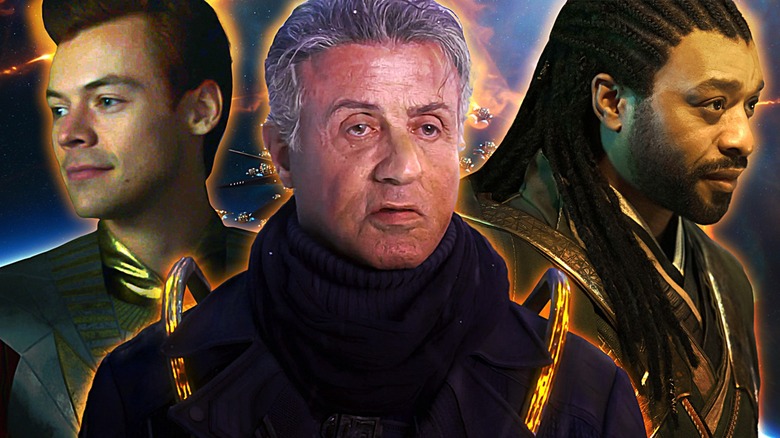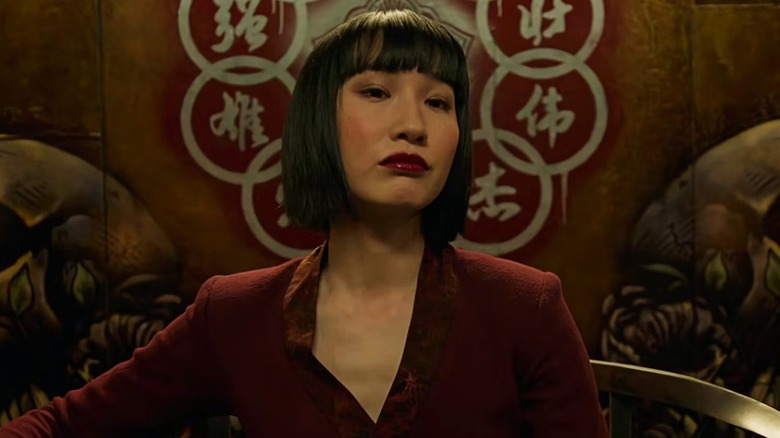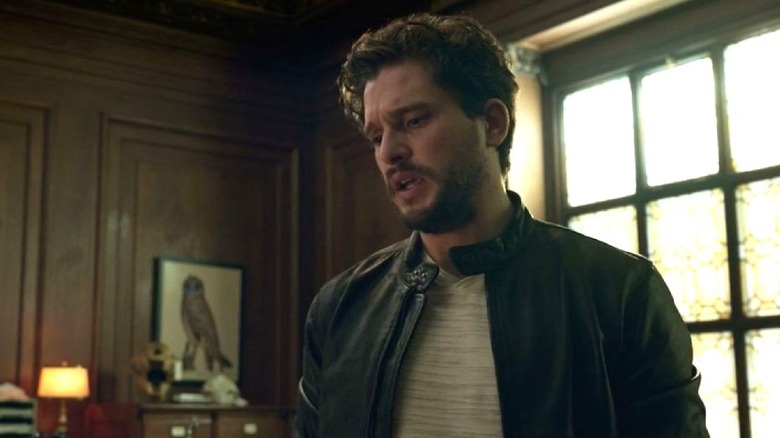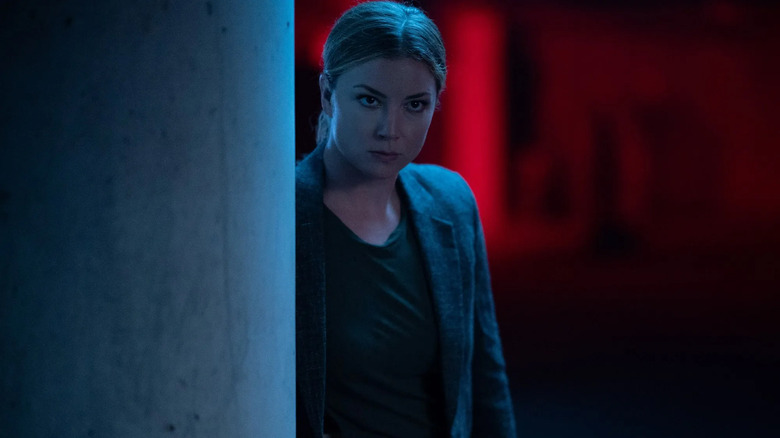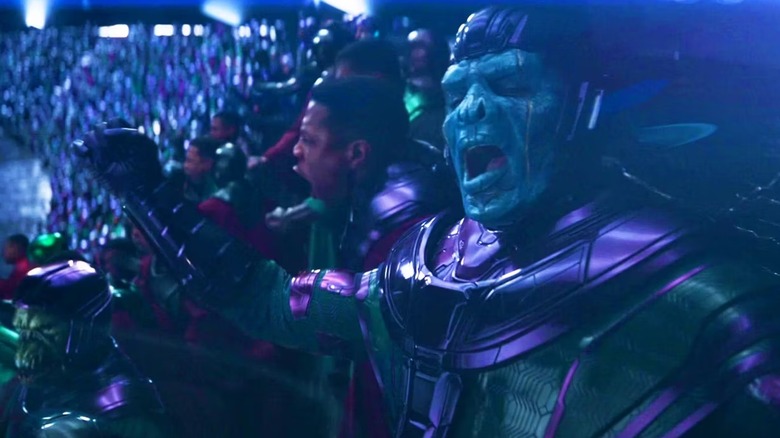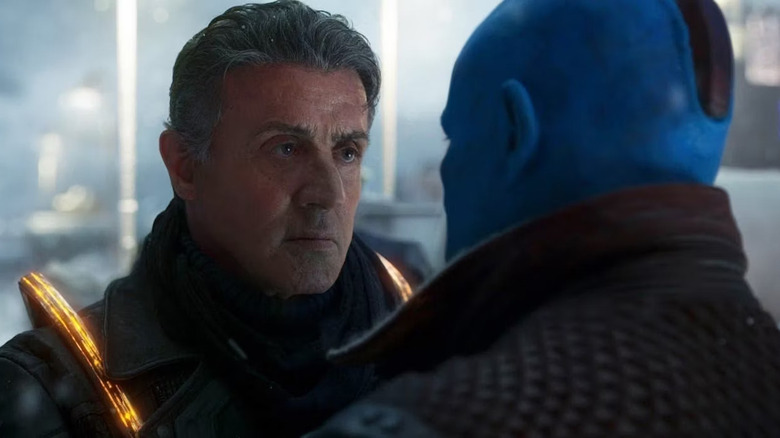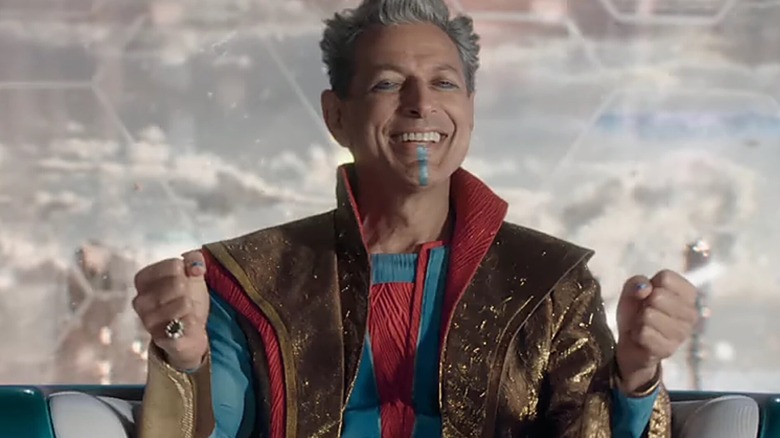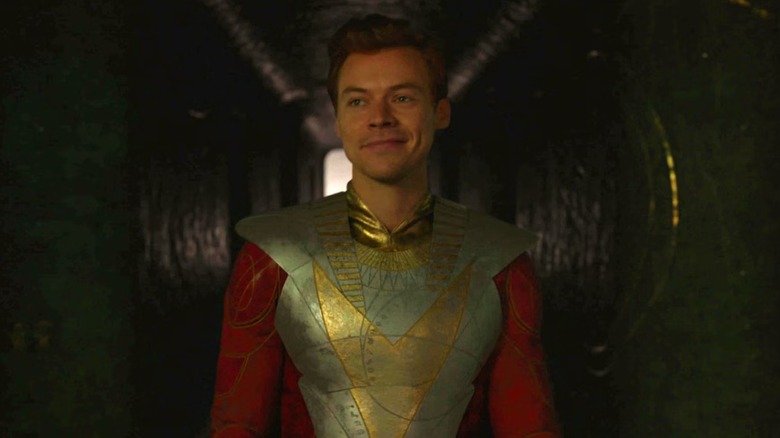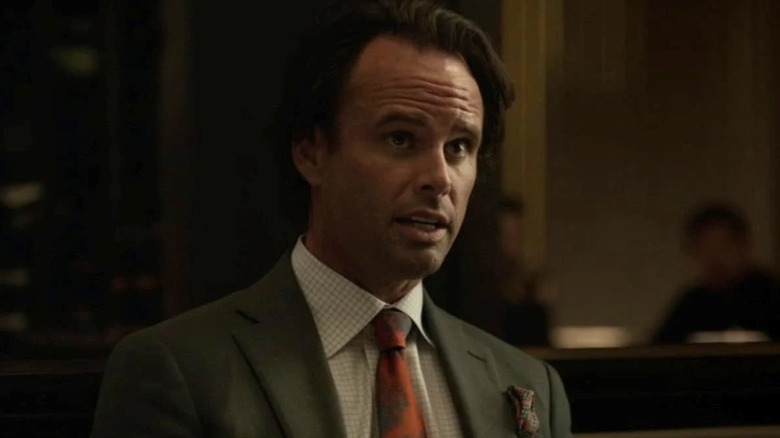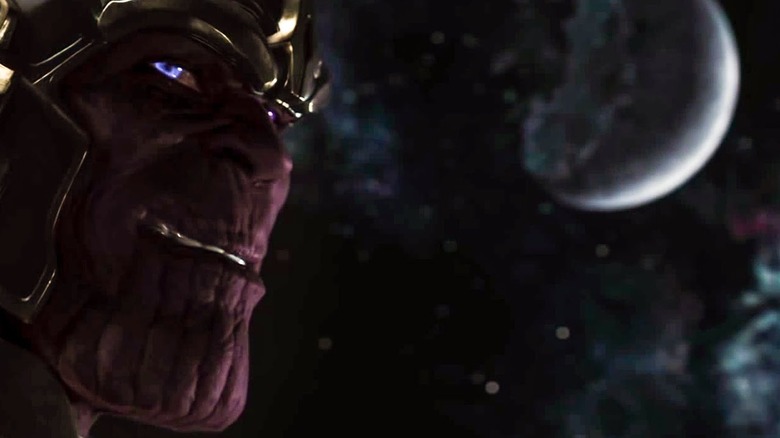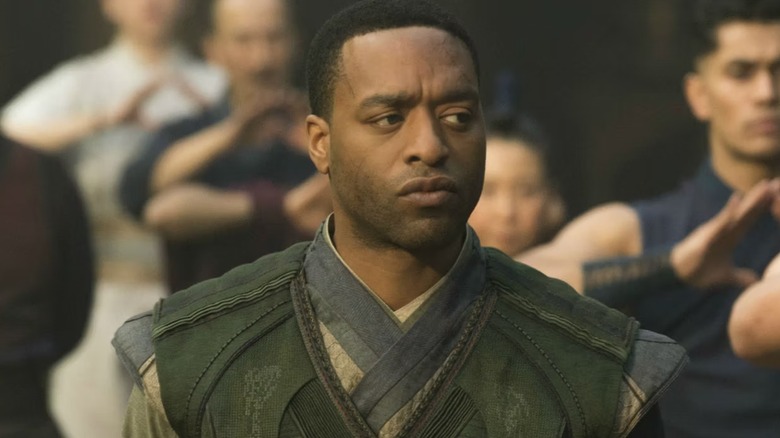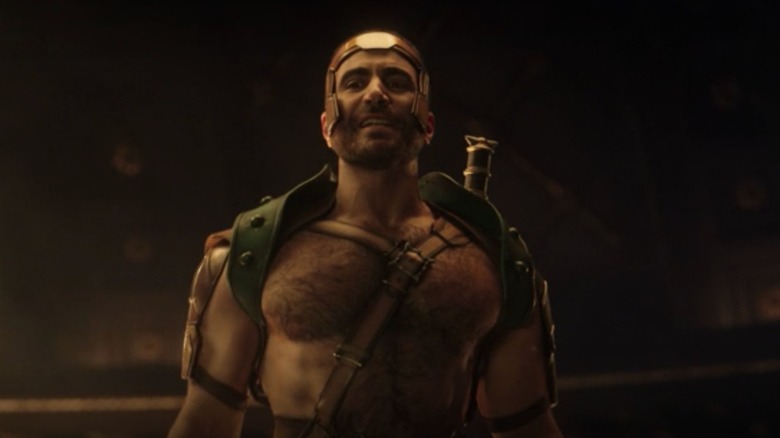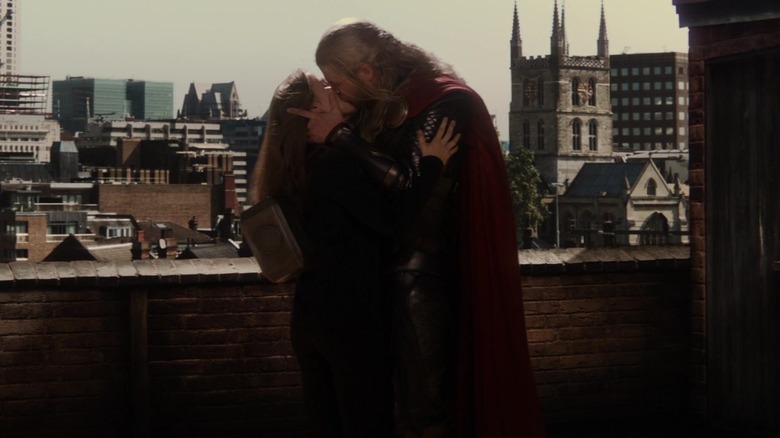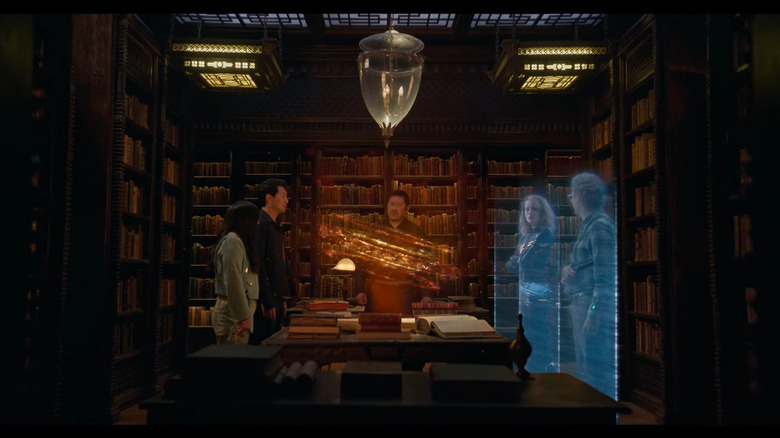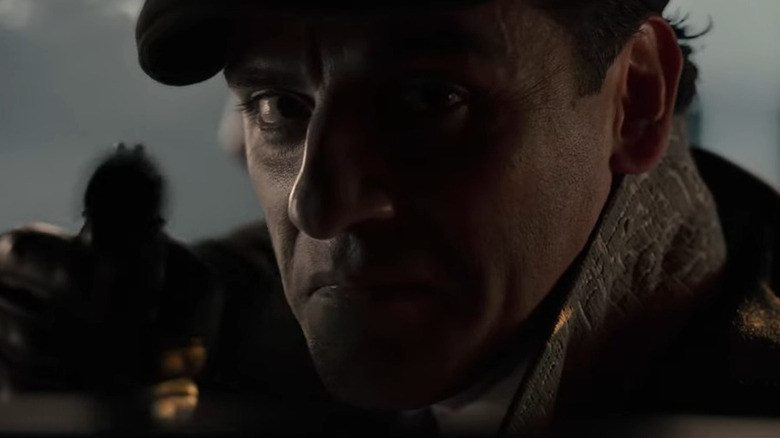Marvel Cinematic Universe Post-Credit Scenes That Never Really Paid Off
The Marvel Cinematic Universe changed the world of cinema forever in many ways, not least of all by popularizing the post-credits scene. Though these stingers may be the bane of parents, tolerating partners, and movie theater cleaning staff, they were capable of sending chills throughout the audience with promises of what to come. "Promises" being the operative word.
From Nick Fury's ambush of Tony Stark at the end of the first "Iron Man" to the debut of Thanos at the end of the first "Avengers," earlier MCU post-credits scenes were clear, direct references to a future film that was going to be released — often within the next few months. But as the universe continued to expand not just to larger yearly film slates, but the medium of television, these scenes seemingly shifted in purpose. Instead of getting fans excited for the next project, or even a project that was guaranteed a release at the time, they became empty spectacles of more ambitious promises — many of which feel unkeepable given the current state of the MCU.
The appearance of a certain super-team's ship at the end of "Thunderbolts*" is really the first time in a while fans can be confident a post-credits scene is setting something up that will actually pay off. Who knows when we'll follow up on T'Challa's secret child from "Black Panther: Wakanda Forever," or whatever's coming of that team-up teased at the end of "The Marvels?" Even worse than these scenes, however, are those which have definitively gone nowhere — the many promises Marvel has refused to keep, despite you staying with them till the end of the line. (Or, rather, the credits.)
Shang-Chi and the return of the Ten Rings
No one can say Simu Liu's not bringing the energy required for a sequel to "Shang-Chi" to the table. In great news for fans, he's still his character's biggest advocate, with his skills as a performer giving life to a wuxia-themed superhero with an unusually rich connection to the then-fledgling multiverse. When last we saw Shang-Chi and his friends and family, there was still a riddle attached to those mystic Ten Rings he wore. Fan speculation and strong clues suggest a tie to "Ms. Marvel's" multiversal Djinn. But whatever the truth really is, Wong and Dr. Banner haven't said a peep since.
For those that love a bad babe in charge, "Shang-Chi" also suggested that the fall of Xu Wenwu (Tony Leung) was a temporary problem. His Ten Rings criminal enterprise lives on in his daughter, Xu Xialing (Meng'er Zhang), despite promising her brother, Shang-Chi, that she would tear the old empire down. All she's actually done is bring girl boss energy to the team, training female assassins and warriors alongside the men for goals we're not yet privy to. We would like to see it.
The Black Knight might not return, actually
"Game of Thrones" star Kit Harington seems content to take things in stride wherever possible since the harrowing and controversial last season of HBO's breadwinner series, and he's equally chill about the possibility that Dane Whitman, the Black Knight, has shown no potential for a future return. Harington recently spoke about the odds of his return to Marvel, stating that he hopes they'll do something with the character, but right now, he simply doesn't know anything, and nothing is currently in the works.
That's a big change from 2021 and the post-"Eternals" glow, which suggested that Dane's introduction didn't just give fans a chance to hear Mahershala Ali as Blade for the first time, but was also a set-up for a larger story for his own character. Unfortunately, a shudder in the multiverse suggest this has all been set aside, especially as Marvel is still figuring out the right way to formally introduce the Daywalker Blade after numerous behind-the-scenes shakeups. Let's stow the Jon Snow Knows Nothing jokes and admit that this is another bad twist in a good actor's career.
Sharon Carter, Power Broker?
There were two major points of contention for fans to debate as "The Falcon and the Winter Soldier" series on Disney+ wrapped up. No, not how much we hated US Agent, aka John Walker (Wyatt Russell, doing a fantastic job that earned him a return in "Thunderbolts*"), since that seemed pretty universal. The first point was the arguably iffy use of the Flag Smashers, who made some good post-Blip points in a muddy mess about unity as a people. The other was who the heck green-lit Sharon Carter (Emily VanCamp) becoming the villainous Power Broker?
After her heroic departure from "Captain America: Civil War," where Sharon had been Steve Rogers' own moral compass, this was the twist nobody wanted. It should have been the impetus for a "Marvel Zombies" moment where Peggy Carter (Hayley Atwell) claws herself out of the grave to personally give her niece an earful. Not even the bedeviled "Secret Invasion" gave Carter fans the out they wanted. The only thing that would've made sense out of Sharon selling out her country the second she got her pardon was being unmasked as a Skrull. But that didn't happen, and her big ticket auction announcement on the courthouse steps still hasn't paid off. There's a lot of ways it can still happen, but it doesn't mean we're going to be happy about it. Look, can we just... blip this part?
The Council of Kangs
With an aspect of Kang introduced in "Loki" as He Who Remains (Jonathan Majors), it seemed like the Avengers finally had their new big bad. Another variant of Kang was introduced in "Ant Man and the Wasp Quantumania" not long after, and this scarier version had an iron grip on the entire Quantum Realm. Scott Lang (Paul Rudd) made defeating a Kang look moderately easy, although it took a father's will to nail the job for good. But the real problem for the MCU's future lay in the credits scene, where a lot of Kangs — the comic book-infamous Council of Kangs — gathered together to shout their rage at an unfair multiverse.
Then a slew of allegations, followed by a criminal trial, sidelined Jonathan Majors. While Disney and Marvel remain tight-lipped about the conversations they would have held as Majors' legal troubles worsened, fans quickly twigged to how neatly season two of "Loki" left the Kang situation wrapped up. After Majors' firing, it's clear they were right. With clear shifts to Doctor Doom, who will be played by "Iron Man" star Robert Downey Jr., and Ryan Reynolds' "Deadpool & Wolverine" showing how to navigate the multiverse without a Kang at the helm, it certainly seems like the Conqueror will be doing precious little of that for a long time.
Stakar and his Guardians of the Galaxy
Over a long career in gonzo horror and superhero sci-fi, James Gunn has made some friends that are incredibly cool. From the fan favorite Nathan Fillion to the always excellent Michael Rooker, once a Gunn production gets rolling, you know you're going to see a few familiar faces return. Possibly one of the most surprising names in the recurring Gunn retinue, though, is Sylvester Stallone. It's not hard to fall in love with his murderously violent but loyal King Shark over at DC, but Gunn fans first saw Stallone as one of the earliest original Guardians of the Galaxy, the stern Stakar, in "Guardians of the Galaxy Vol. 2." It was a cameo that granted him a whole team fans could wonder about, but as of "Vol. 3," Stakar's own adventures seem pretty firmly over.
To be fair, Stakar gets a small return in the trilogy finale as the crew that the variant of Gamora (Zoe Saldana) falls in with after the events of "Infinity War." But that second movie moment made us feel like Stakar (to say nothing of Michelle Yeoh's Aleta and Michael Rosenbaum's Martinex) was going to have more to do in the MCU. Gunn even said as much, with a plan to see more of him and his team in the future. With Gunn's new job as master of the DC Universe, Stakar appears to be lost in space.
The Grandmaster's games are on pause
A little of Jeff Goldblum can go a long way, but a lot of Jeff Goldblum can also be a joy to let loose. Taika Waititi did exactly that in "Thor: Ragnarok," casting the eccentric actor as The Grandmaster, one of the immortal Elders of the Universe. With the other known MCU elder being the equally bonkers lord of Knowhere, The Collector (Benecio Del Toro), these ancient beings had clearly settled on a type.
Yet for all his immortality, The Grandmaster is a selfish, sometimes childish twit that thrives on his own version of the nightlife, despite the costs to his Sakaaran subjects. So when Thor and his new friends Valkyrie (Tessa Thompson) and Korg (Waititi) leave The Grandmaster behind, they've also done a number on his high life, too. At the movie's end, he's surrounded by an angry, hungry mob, and he doesn't look like he's going to talk his way out of it.
Whether or not The Grandmaster actually survived the day is unclear, as is whether he and the other Elders ever intend to reappear. The only clue is if one considers the goofy "Team Darryl" short film canon. In which case, The Grandmaster may be laying low as some ordinary dude's roommate. Unless he got evicted. Which, let's face it, he probably did.
No love for Eros?
Unfortunately, for those of us that enjoyed what director Chloe Zhao was trying to cook up in "Eternals," any follow-up to the world of this unique band of immortals is on pause. The final word comes down from none other than Kevin Feige himself, who says there is no sequel in the works. While that's understandable, it's still a loss. Baroque, visually stunning, and laden with glimpses of fascinating lives — we stan Kingo (Kumail Nanjiani) in this house — "Eternals" was a weird film with a few big issues dragging it down, such as pretty much everything to do with the Deviants.
While Dane Whitman is left hanging in the wake of this movie, he's not the only one. Harry Styles as Thanos' brother Eros remains one of the most out of pocket casting decisions the MCU has ever made, and his reveal — alongside Patton Oswalt as his friend, Pip the Troll — at the end of "Eternals" was certainly a moment to talk about. Just maybe not in the kindest of ways. With the sequel shut down, it's possible the return of Eros is out the window, too. This one might be for the best. At least "Captain America: Brave New World" finally addressed the big dead Celestial that's been sitting in the ocean.
Sonny Burch's big goals
If you somehow missed "The Shield" or "Justified," perhaps "Fallout" or "The White Lotus" finally got you to realize that Walton Goggins has always been one heck of an actor to watch. It might have also reminded you that Goggins has indeed long since become part of the MCU, if only for a hot minute in a role that could use a lot of expansion. Sonny Burch is the miniboss of "Ant-Man and the Wasp," and he's a greasy nouveau riche black market dealer that's holding a plot widget the Pym family needs to rescue Janet Pym (Michelle Pfeiffer) from the Quantum Realm.
Burch is quickly sidelined by a deadly situation with the mysterious Ghost (Hannah John-Kamen) and then further reduced to comic relief as the X-Con crew eventually drag him towards justice. Cute, but Burch (and Goggins) has real potential as another mover on par with the also eternally watchable Sam Rockwell as Justin Hammer. If that "Armor Wars" movie ever actually happens, that would be a great platform for black market baddies to steal the show. Heck, picture a Tarantino-esque Disney+ "Armor War" prelude miniseries, where Rockwell and Goggins talk crap at each other for an hour and a half. We'd be seated.
Thanos never did court Death
While we can't argue too much with the coolness of the on screen results, the original stinger for "The Avengers" still feels like it puts a lot more emphasis on the classic comic book relationship between Thanos (Josh Brolin) and Death than we got. Death, the original Living Dead Girl (and a hottie that once drew Deadpool's eye as well) is a immortal entity on par with the vaguely defined Eternity of "Thor: Love and Thunder." She's a cosmic power, an aspect of the universe, and, originally, the driving force behind Thanos' mad directive to cull half the universe.
Yet none of that is apparent in "Infinity War," sidestepped in favor of Thanos' obsession with the universal division of resources. Or something. Without Death to add another dimension to his violent purge, we can't help but get hung up on how killing half of everything doesn't actually fix whatever he thinks his problem is. Thanos is unhinged, a murderous romantic who thinks he's doing the right thing for noble reasons. What was more noble than love, and how wrenching could it have been if he'd had to choose between his Deathly lover and his daughter, Gamora, there on Vormir? Guess we'll never know the impact Death could have, at least not yet.
Baron Mordo's revenge
Sam Raimi's "Doctor Strange in the Multiverse of Madness" has a somewhat divided fan following, based heavily on whether or not you were prepared for the Raimi goulash of camp and line-crossing violence. One thing it did do, however, was bring back Baron Mordo (Chiwetal Ejiofor), as the original "Doctor Strange" promised. However, the Mordo we meet this time is a Variant, a survivor of multiversal incursions who's loyal to the Illuminati and all in on their efforts to prevent any further breaks in reality.
That's nice, and more Ejiofor is better than less, but it's not what Strange fans were prepared for after his final scene in the original 2017 film. There, Mordo is still reeling from his perceived 'betrayals,' and hopped up on the idea that magic should be ripped from undeserving hands. He illustrates this by tearing the gift out of Jonathan Pangborn (Benjamin Bratt), setting up a future showdown with Doctor Strange. Seven years later, the Baron Mordo of our primary timeline hasn't done anything else with his rage. We know you're supposed to serve revenge cold, but buddy, we're getting past the expiration date on the package. Come on.
Hercules is not in New York
Brett Goldstein may or may not be on your radar, depending on your personal tolerance for "Ted Lasso," but this sturdy lad with a pretty good beard was a fine pick for Marvel's Hercules, a character who may also not be on your comics radar, as he's kind of a cult fave for longtime fans. Nevertheless, the fans in the know were excited to see Russell Crowe's Zeus pull his favorite demigod son in for a huddle at the end of "Thor: Love & Thunder," and they've been eagerly waiting for the announcement of Herc's revenge gig on Thor.
They're still waiting, as it happens, and while "Love & Thunder" isn't yet a movie lost in the distant past, it was seen by many as a stumble for director Taika Waititi and Marvel Studios. After how well "Thor: Ragnarok" was received, the follow-up was both clunkily paced and insultingly light on Christian Bale's fantastic version of Gorr the God Butcher. With the roster of upcoming MCU work now shuffled heavily around, Thor's future is currently so veiled you'd need to bribe the Norns to guess whether we'll ever see him follow up with Zeus' best boy. If you know your mythology, maybe don't try that at home.
Sorry to hear that Jane dumped you!
Marvel was able to reliably deliver on its post-credits scenes during the early days of the MCU. The first time a crack began to show was during Phase Two, with the release of the abysmal sequel film "Thor: The Dark World." If you're struggling to remember this unremarkable film, it's the one where Chris Hemsworth's god of thunder has to briefly team up with Loki (Tom Hiddleston), immediately after they return to Asgard post-"The Avengers," to fight an Elvish Christopher Eccleston armed with red magic space goo.
One of the film's post-credits scenes does stick the landing, showing audiences that Lady Sif (Jaimie Alexander) and Volstagg (Ray Stevenson) successfully transported said goo (aka the Aether, aka the Reality Stone) to the Collector (Benicio del Toro), setting up his introduction and the concept of Infinity Stones for the then-imminent "Guardians of the Galaxy." Way less memorable or impactful, however, is the second post-credits scene, which shows that Thor has decided to leave his throne on Asgard to return to Earth, choosing once and for all to spend his life among the humans with his love Jane Foster (Natalie Portman).
It's a huge moment for the character that probably should have been placed in the movie proper — though, in hindsight, it has less dramatic weight than most post-credits scenes. Portman is neither in "Avengers: Age of Ultron" nor "Thor: Ragnarok," the latter film revealing in a throwaway line that Jane and Thor broke up. Though "Thor: Love and Thunder" does revisit this plot thread in slap-dash fashion, it's obvious Marvel fully planned to abandon it entirely right then and there. (Russell Murray)
A message to where? Who knows.
Xu Xialing's ascent to power isn't the only dangling thread at the end of "Shang-Chi and the Legend of the Ten Rings." In fact, even the slim chance it has at getting resolved is better than what we can say about the story introduced in the other post-credits scene in the film.
Presumably through his connection with Wong (Benedict Wong's Sorcerer Supreme, whom Shang-Chi meets at an underground fighting tournament in the film), Shang-Chi presents the titular ten rings of power to what remains of the Avengers — Bruce Banner (curiously in human form, though "She-Hulk: Attorney at Law" eventually fills us in as to why that's possible post-"Endgame") and Captain Marvel (Brie Larson). For whatever reason, they were all very concerned about the ten rings' power source — and, after some super-scientific analysis, Banner is able to discover that there's some kind of energy pulse emitting from them. Characters describe it as a "beacon" or "message," with the big cliffhanger question being, "A message to where?"
Will the MCU ever answer that question? It's hard to know for sure, but our guess is... not really. Given both the context of this fairly significant moment and the fact that it hasn't been paid off in any of the Marvel movies released since, it's reasonable to assume that it was originally meant to tease something for the "Avengers" films releasing at the end of the Multiverse Saga. This might still turn out to be true, but it almost definitely won't be what anyone at Marvel had planned when "Shang-Chi" was released. In the years since, the MCU has overhauled the finale to this saga following the arrest and trial of Kang actor Jonathan Majors, and original "Avengers: The Kang Dynasty" director Destin Daniel Cretton (also the director of "Shang-Chi") is now busy with "Spider-Man 4." At best, this scene will get reverse engineered into whatever the Russo Brothers have come up with. (Russell Murray)
Meet my friend, Jake Lockley... or, actually, never mind.
We've talked about several scenes so far that introduced characters or storylines that we're bummed we won't see, but few if any entries on this list sting quite like the cliffhanger at the end of "Moon Knight." Having explored the compelling dynamic between the dual personalities of Marc Spector and Stephen Grant (both sharing the body of Oscar Isaac), as well as their relationship to the controlling Egyptian god Khonshu (F. Murray Abraham), the series ends with Marc and Stephen teaming up to free themselves of Khonshu's manipulation — only for the audience to find out in a post-credits scene that there is a third, secret personality unknown to either Marc or Stephen, who is still devoted to Khonshu.
As the moon god so politely says, this is Jake Lockley, a personality with a much shadier moral compass who murders Ethan Hawke's Arthur Harrow on Khonshu's orders. Jake had been hinted at numerous times throughout the series proper, and had even briefly taken control in episode 3. All this work was surely in service of more than a shocking twist ending, with Jake's introduction setting up an even more volatile dynamic for "Moon Knight" to unravel in a second season... right?
Essentially, "Moon Knight" season 2 is very possible, but also very complicated. Perhaps because he was burnt out spending his late 30s stuck in the "Star Wars" universe, Isaac was wary of getting locked into anything too big too soon, and thus only signed onto "Moon Knight" with the understanding that he wouldn't be obligated to do anything more than one season. It'd be a shame if this is all we get to see of Jake, given that Isaac's performance was so terrifying he scared the crew while they were experimenting with the character. (Russell Murray)
